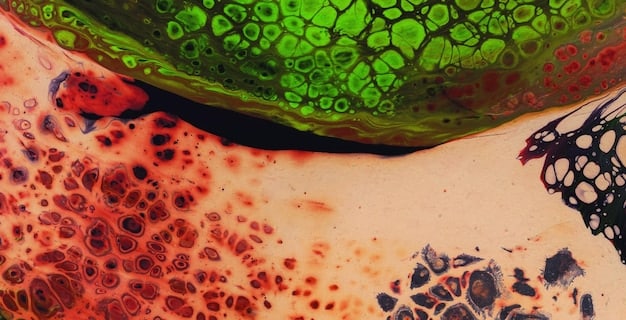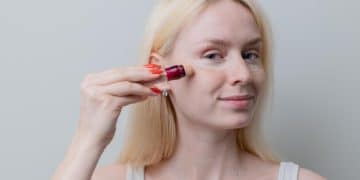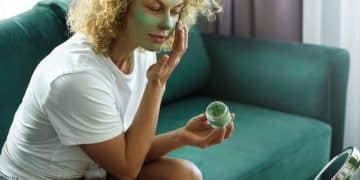Preventing Premature Aging: 5 Habits for Younger Skin in Your 20s

Anúncios
Adopting key skincare and lifestyle habits in your 20s is crucial for preventing premature aging, establishing a foundation for long-term skin health, and maintaining a youthful appearance for decades to come.
Embarking on your 20s often feels like a limitless expanse, a time of new adventures, career pursuits, and personal growth. Yet, beneath the surface of youthful vitality, the clock of cellular aging quietly ticks. While the signs may not be immediately apparent, the choices you make during this decade significantly influence the trajectory of your skin’s health and appearance for years to come. Understanding how to navigate these formative years with a proactive approach to skincare can genuinely make a monumental difference in Preventing Premature Aging: 5 Habits to Adopt in Your 20s for Long-Term Skin Health.
Anúncios
The science behind skin aging: why your 20s matter
The skin, our body’s largest organ, undergoes a complex series of changes over time, influenced by both internal, genetic factors and external, environmental aggressors. While chronological aging is inevitable, premature aging, characterized by the early onset of wrinkles, fine lines, sunspots, and loss of elasticity, is largely preventable. Your 20s represent a pivotal period for intercepting these processes.
This decade is when collagen and elastin production, the vital proteins responsible for skin’s firmness and elasticity, begins its gradual decline. Though subtle, this reduction sets the stage for future signs of aging. Furthermore, lifestyle choices made during these years, such as sun exposure habits, diet, and stress levels, can either accelerate or delay the visible manifestations of aging. Understanding these underlying biological shifts empowers you to adopt preventative measures effectively.

Anúncios
Understanding intrinsic vs. extrinsic aging
Skin aging is broadly categorized into two main types: intrinsic (chronological) and extrinsic (environmental). Intrinsic aging is genetically determined; it’s the natural process of wear and tear on our cells over time. Parameters like genetics, cell metabolism, and hormone levels play a significant role. For instance, some individuals are naturally predisposed to developing wrinkles earlier due to their genetic makeup, which dictates their skin’s collagen production and repair mechanisms. This type of aging is largely unavoidable but can be influenced by how well we support our body’s natural processes.
Extrinsic aging, on the other hand, is primarily driven by external factors. Sun exposure, pollution, smoking, poor diet, and even sleep deprivation are major contributors to this type of aging. These factors generate free radicals, unstable molecules that damage skin cells, DNA, and proteins like collagen and elastin. This damage accumulates over time, leading to visible signs of aging. In your 20s, a significant portion of the aging process is influenced by these extrinsic factors, making it a prime time for preventative action.
The role of collagen and elastin
Collagen is the most abundant protein in the skin, forming a fibrous network that provides structure, strength, and support. Elastin, as its name suggests, gives skin its elasticity, allowing it to stretch and snap back into place. Both are crucial for maintaining a youthful complexion.
Around the mid-20s, the body’s natural production of collagen begins to decrease by about 1% per year. Concurrently, existing collagen and elastin fibers become more fragile and break down more easily. This decline is exacerbated by extrinsic factors. Chronic sun exposure, for instance, triggers enzymes that degrade collagen and elastin, leading to a loss of firmness and the formation of wrinkles. Understanding this biological reality underscores the importance of protecting these vital proteins proactively.
The accumulation of damage from extrinsic factors is not immediately apparent. It takes years for this cellular damage to manifest as visible signs of aging. Therefore, what you do in your 20s is effectively an investment in your skin’s future. By minimizing damage and supporting the skin’s natural repair mechanisms, you can significantly slow down the aging process and maintain a more youthful appearance for longer.
Habit 1: sun protection – your daily non-negotiable
If there’s one single habit that reigns supreme in the quest for lasting skin health, it’s diligent sun protection. The sun’s ultraviolet (UV) rays are the primary drivers of extrinsic aging, responsible for an estimated 80% of visible signs of aging, including premature wrinkles, fine lines, hyperpigmentation (sunspots), and a loss of skin elasticity. Establishing a robust sun protection routine in your 20s isn’t just about preventing sunburn; it’s about safeguarding your skin’s collagen and elastin fibers from degradation and dramatically reducing your risk of skin cancer.
Sun exposure, even incidental exposure from walking to your car or sitting near a window, accumulates over time. This cumulative damage is what leads to photoaging. You might not see the effects immediately, but years of unprotected exposure will eventually surface as sunspots, a leathery texture, and deep-set wrinkles that weren’t genetically destined to appear so early. Making sunscreen a non-negotiable part of your daily routine is an investment that truly pays dividends in the long run.
Choosing the right sunscreen
Not all sunscreens are created equal. For daily use, opt for a broad-spectrum sunscreen with an SPF of 30 or higher.
- Broad-spectrum protection: This means the sunscreen protects against both UVA and UVB rays. UVA rays contribute to aging (think “A” for aging), while UVB rays primarily cause sunburn (think “B” for burn). Both are harmful.
- SPF 30 or higher: SPF (Sun Protection Factor) indicates how well a sunscreen protects against UVB rays. SPF 30 blocks approximately 97% of UVB rays, while SPF 50 blocks about 98%. Higher SPFs offer marginally better protection but require the same reapplication.
- Formulation: Choose a formula that suits your skin type. If you have oily or acne-prone skin, look for “non-comedogenic” or “oil-free” formulations. Mineral sunscreens (containing zinc oxide and titanium dioxide) are often preferred for sensitive skin as they sit on top of the skin and physically block rays. Chemical sunscreens absorb UV radiation and convert it into heat.
Beyond sunscreen: comprehensive sun safety
While sunscreen is vital, it’s just one component of a comprehensive sun safety strategy.
- Seek shade: The sun’s rays are strongest between 10 AM and 4 PM. If you must be outdoors during these hours, seek shade under trees, umbrellas, or canopies.
- Wear protective clothing: Long-sleeved shirts, pants, wide-brimmed hats, and UV-protective sunglasses offer excellent physical barriers against the sun. Look for clothing with a UPF (Ultraviolet Protection Factor) rating for added assurance.
- Reapply sunscreen diligently: Sunscreen’s effectiveness decreases over time, especially with sweating or swimming. Reapply at least every two hours, or more frequently if you’re active or in water.
Incorporating these habits ensures that you’re minimizing your skin’s exposure to harmful UV radiation, a fundamental step in preserving its youthful vitality. Consistency is key; make sun protection as automatic as brushing your teeth.
Habit 2: adopt a consistent, targeted skincare routine
Beyond sun protection, a thoughtful and consistent skincare routine is paramount for maintaining skin health in your 20s. This isn’t about accumulating a bathroom cabinet full of products, but rather selecting key ingredients that work synergistically to protect, nourish, and support your skin’s natural repair processes. A well-rounded routine addresses current concerns while laying the groundwork for long-term resilience against aging. Think of your skincare routine as a daily ritual that not only keeps your skin clear and vibrant in the present but also fortifies it against the challenges of the future.
The goal isn’t to reverse aging in your 20s – because there’s nothing to reverse yet – but to prevent it. This means focusing on hydration, antioxidant protection, gentle exfoliation, and early introduction of reparative ingredients. Skipping steps or using products inconsistently can negate their benefits, making daily commitment crucial. Start simple, understand your skin’s needs, and then gradually introduce targeted treatments as required.
The core pillars of a 20s skincare routine
A minimalist yet effective routine suitable for most 20-somethings generally includes these steps:
- Cleansing: Use a gentle cleanser twice daily to remove makeup, dirt, oil, and pollution without stripping the skin’s natural moisture barrier. Over-cleansing or using harsh cleansers can disrupt the skin’s pH, leading to irritation and compromised barrier function.
- Antioxidant serum (e.g., Vitamin C): A morning antioxidant serum, particularly one containing Vitamin C, is a game-changer. Vitamin C is a powerful antioxidant that neutralizes free radicals generated by UV exposure and pollution, brightens the complexion, and even stimulates collagen production. Apply it after cleansing and before sunscreen.
- Moisturizing: Even oily skin types need moisturizer. A good moisturizer helps maintain the skin’s barrier function, preventing transepidermal water loss and keeping the skin plump and hydrated. Choose a lightweight, non-comedogenic formula for daytime, and potentially a richer one for evening if your skin is on the drier side.
- Sunscreen: As previously emphasized, this is the final and most crucial step in your morning routine.
Incorporating targeted treatments for prevention
In the evening, after cleansing, you can introduce more targeted treatments that work overnight to repair and rejuvenate:
- Retinoids (Retinol): This is arguably the most powerful anti-aging ingredient available over-the-counter. Retinol, a derivative of Vitamin A, stimulates collagen production, accelerates cell turnover, and reduces the appearance of fine lines and texture irregularities. Start with a low concentration (e.g., 0.25% or 0.3%) a few times a week and gradually increase frequency as your skin tolerates it. Consistency is key, but so is patience, as results take time.
- Hydrating treatments (Hyaluronic Acid): If you struggle with dryness or dehydration, a hyaluronic acid serum can be a great addition. Hyaluronic acid attracts and holds moisture, plumping the skin and improving its overall elasticity. It layers well with most other ingredients and can be used both morning and night.
- Eye cream: The skin around the eyes is thinner and more delicate, making it susceptible to early signs of aging. While a good facial moisturizer can suffice, a dedicated eye cream formulated with hydrators, antioxidants, and gentle peptides can provide targeted care.
Remember, consistency is more important than product overload. Start with the basics, listen to your skin, and gradually introduce new products one at a time to avoid irritation and identify what works best for you.
Habit 3: nourish your skin from within – diet and hydration
Skincare isn’t just about what you apply topically; it’s profoundly influenced by what you put into your body. Proper nutrition and adequate hydration are fundamental pillars for supporting skin health and preventing premature aging from the inside out. Your skin reflects your internal health, and a diet rich in essential nutrients, antioxidants, and healthy fats can significantly enhance its resilience, radiance, and ability to repair itself. Ignoring the internal aspects of skin health while focusing solely on topical treatments is like trying to fix a leaky roof while the plumbing is breaking down inside the house.
Food acts as fuel for your cells, providing the building blocks for new tissue and the protective compounds that combat damage. Hydration is equally critical, as water is essential for every metabolic process, including those that keep your skin plump and functioning optimally. In your 20s, when metabolism is often high, it’s easy to overlook nutritional deficiencies or chronic dehydration, assuming youth will compensate. However, cumulative dietary choices will ultimately manifest on your skin.
The anti-aging diet: what to eat
Focus on a diet rich in whole, unprocessed foods.
- Antioxidant-rich fruits and vegetables: Berries, leafy greens (spinach, kale), bright-colored vegetables (bell peppers, carrots), citrus fruits, and tomatoes are packed with vitamins (C, E, A) and other antioxidants that combat free radical damage. These compounds help protect collagen and elastin.
- Healthy fats: Omega-3 fatty acids, found in fatty fish (salmon, mackerel), flaxseeds, chia seeds, and walnuts, are crucial for maintaining the skin’s lipid barrier, reducing inflammation, and keeping skin supple. Monounsaturated and polyunsaturated fats from avocados, nuts, and olive oil also contribute to skin health.
- Lean proteins: Protein is essential for collagen and elastin synthesis. Include sources like lean meats, poultry, fish, legumes, and tofu in your diet. Amino acids are the building blocks for these vital skin proteins.
- Avoid processed foods and excessive sugar: High sugar intake can lead to glycation, a process where sugar molecules bind to proteins (like collagen), making them stiff and rigid, contributing to wrinkles and loss of elasticity. Processed foods often lack essential nutrients and can promote inflammation.
The power of hydration
Water is a critical component of healthy skin. Dehydrated skin can appear dull, tight, and less resilient, making fine lines more apparent.
- Drink plenty of water: Aim for at least eight glasses of water a day, though individual needs may vary based on activity level and climate. Water helps deliver nutrients to skin cells and flush out toxins.
- Incorporate hydrating foods: Many fruits and vegetables, like cucumbers, watermelon, oranges, and lettuce, have high water content, contributing to overall hydration.
Prioritizing fresh, nutrient-dense foods and staying adequately hydrated supports your skin’s health at a cellular level, enhancing its natural protective and regenerative capabilities.
Habit 4: master stress management and prioritize sleep
In the fast-paced world of your 20s, stress can feel omnipresent, and sleep often seems like a luxury. However, chronic stress and insufficient sleep are silent aggressors that can significantly accelerate the skin’s aging process. These factors disrupt hormonal balance, trigger inflammatory responses, and impair the skin’s natural repair mechanisms, leading to issues like acne, dullness, and the premature formation of lines and wrinkles. Viewing stress management and quality sleep not as optional extras but as integral components of your skincare regimen is essential for long-term skin vitality.
The connection between your mind and your skin is profound, often referred to as the “brain-skin axis.” When you’re stressed, your body releases hormones like cortisol, which can increase oil production, exacerbate inflammatory conditions, and break down collagen. Furthermore, the regenerative processes that repair and rejuvenate skin cells primarily occur during deep sleep. Depriving your skin of this crucial recovery time can leave it vulnerable and unable to adequately defend itself against daily environmental assaults.
The impact of stress on skin
Chronic stress leads to a cascade of effects that can prematurely age your skin:
- Hormonal imbalance: Elevated cortisol levels can trigger breakouts, increase oiliness, and contribute to inflammation that damages skin cells.
- Impaired barrier function: Stress can weaken the skin’s protective barrier, making it more susceptible to dehydration, environmental toxins, and irritants.
- Slower wound healing: Studies show that psychological stress can delay the skin’s natural ability to repair itself from wounds or general wear and tear, leading to longer-lasting blemishes and a slower recovery from damage.
- Inflammation: Chronic low-grade inflammation, often fueled by stress, contributes to oxidative stress and the breakdown of collagen and elastin.
Effective stress management techniques are vital. Explore activities like yoga, meditation, mindfulness, spending time in nature, regular exercise, or even creative hobbies. Finding healthy outlets for stress can significantly mitigate its negative impact on your skin and overall well-being.
The restorative power of sleep
Sleep is your body’s dedicated repair period, and this is especially true for your skin.
- Cell regeneration: During deep sleep, cell division and regeneration accelerate. This is when your skin produces new cells, repairs daily damage, and replaces old cells.
- Collagen production: Growth hormone release, which peaks during sleep, plays a role in stimulating collagen production. Consistent, quality sleep supports your skin’s structural integrity.
- Reduced cortisol: Adequate sleep helps regulate cortisol levels, preventing the stress-induced damage discussed earlier.
- Improved hydration: During sleep, your skin’s moisture barrier rebalances; insufficient sleep can lead to increased transepidermal water loss and dehydration.
Aim for 7-9 hours of quality sleep per night. Establish a consistent sleep schedule, create a relaxing bedtime routine, limit screen time before bed, and ensure your sleep environment is dark, quiet, and cool. Prioritizing sleep is not a luxury; it’s a fundamental biological need that directly impacts your skin’s youthful appearance and ability to recover.
Habit 5: avoid harmful habits and embrace mindful living
While adopting beneficial habits is crucial, preventing premature aging also necessitates letting go of common practices that actively harm your skin. Certain lifestyle choices can dramatically accelerate the breakdown of collagen, induce oxidative stress, and impair the skin’s natural healing capabilities, undermining even the most diligent skincare routine. Your 20s are an ideal time to assess and eliminate these detrimental behaviors, setting a foundation for truly mindful living that supports long-term skin health and overall vitality.
Consider this as damage control, an essential counterpart to proactive skincare and healthy living. Continuously exposing your skin to harmful stressors, whether internal or external, creates a persistent uphill battle. By consciously opting out of these damaging habits, you create an environment where your skin can thrive, repair itself, and maintain its youthful resilience for decades to come.
Stop smoking and excessive alcohol consumption
These are two of the most significant lifestyle choices that actively damage your skin.
- Smoking: Nicotine constricts blood vessels, reducing blood flow to the skin and depriving it of oxygen and essential nutrients. The chemicals in cigarette smoke also directly degrade collagen and elastin, leading to premature wrinkles, especially around the mouth and eyes, and a dull, sallow complexion. It hinders the skin’s ability to heal and can worsen conditions like psoriasis.
- Excessive alcohol: Alcohol is a diuretic, meaning it dehydrates the body, including the skin. Dehydrated skin appears dull, lacklustre, and can accentuate fine lines. Chronic alcohol use can also lead to inflammation, facial redness, and broken capillaries, contributing to a prematurely aged appearance. Occasional moderate consumption may not be as damaging, but habitual heavy drinking significantly impacts skin health.
Quitting smoking and moderating alcohol intake are two of the most impactful decisions you can make for your skin’s future.
Be gentle with your skin and avoid picking
While seemingly minor, harsh treatment of your skin can cause significant, long-term damage.
- Avoid excessive scrubbing: Over-exfoliating or using harsh physical scrubs can disrupt the skin’s protective barrier, leading to irritation, redness, and increased sensitivity. This can make your skin more vulnerable to environmental damage and inflammation. Opt for gentle cleansers and chemical exfoliants (like AHAs or BHAs) used sparingly.
- Don’t pick or squeeze blemishes: This is a cardinal rule of skincare. Picking at pimples, blackheads, or scabs can introduce bacteria, worsen inflammation, push infection deeper, and lead to post-inflammatory hyperpigmentation (dark spots) and permanent scarring. Let healing occur naturally or consult a dermatologist for safe extraction methods.
- Limit hot showers: While comforting, excessively hot water strips the skin of its natural oils, leading to dryness and irritation. Opt for lukewarm water when cleansing your face and showering.
Mindful living and environmental awareness
Embracing a mindful approach extends to your environment and broader lifestyle choices:
- Air quality: Exposure to air pollution (smog, particulate matter) generates free radicals that damage skin cells. Consider using air purifiers in your home and incorporating more antioxidants into your diet and skincare routine to combat atmospheric aggressors.
- Regular exercise: Physical activity improves blood circulation, delivering oxygen and nutrients to skin cells and helping to flush out waste products. Just remember to cleanse your skin after sweating to prevent clogged pores.
- Practice patience: Skincare results take time. Avoid constantly changing products or expecting instant miracles. Consistency and patience are key to seeing sustained improvements and preventing future issues.
By consciously eliminating or minimizing these harmful habits and embracing a more mindful approach to daily living, you are actively supporting your skin’s innate ability to stay healthy, resilient, and youthful well beyond your 20s.
Cultivating a holistic approach to skin longevity
True skin health, and the prevention of premature aging, extends far beyond merely applying creams. It’s an intricate dance between genetics, lifestyle choices, and consistent, intelligent care. The habits you forge in your 20s—a decade of foundational shifts—will undeniably shape your skin’s narrative for the decades that follow. It’s not about achieving perpetual youth, an unrealistic aspiration, but rather about nurturing your skin to age gracefully, maintaining its vitality, resilience, and natural glow for as long as possible.
This holistic perspective acknowledges that the skin is a dynamic organ reflecting internal health as much as external protection. When you prioritize sun safety, implement a targeted skincare routine, nourish your body from within, manage stress effectively, and consciously avoid detrimental habits, you’re not just buying time; you’re building a robust defense mechanism against the multifaceted causes of accelerated aging. These are not isolated practices but interconnected components of a comprehensive strategy for skin longevity.
The beauty of adopting these habits in your 20s lies in their preventative power. While it’s never too late to start, early intervention significantly reduces the cumulative damage that eventually manifests as visible signs of aging. It’s about proactive care rather than reactive treatment, building a reserve of skin health that can withstand the test of time and environmental aggressors. This approach fosters a deeper appreciation for your skin, transforming routine tasks into intentional acts of self-care.
Remember, consistency is the bedrock upon which genuine results are built. Sporadic efforts yield minimal returns. Instead, embed these practices deeply into your daily life until they become second nature. Over time, you’ll witness the tangible benefits of your commitment: clearer, more resilient skin that radiates health and vitality. Embrace these habits not as burdens, but as empowering choices that grant you agency over your skin’s future, allowing you to reveal a confident, healthy complexion at every age.
| Key Habit | Brief Description |
|---|---|
| ☀️ Sun Protection | Daily broad-spectrum SPF 30+ use to prevent UV damage and aging. |
| 🧴 Targeted Skincare | Consistent routine with cleanser, antioxidant, moisturizer, and retinoid. |
| 🍎 Nutrition & Hydration | Diet rich in antioxidants, healthy fats, lean proteins, and plenty of water. |
| 🧘♀️ Stress & Sleep | Manage stress and get 7-9 hours of quality sleep for skin repair. |
Frequently Asked Questions about Preventing Premature Aging
Starting anti-aging habits in your 20s is crucial because this is when collagen and elastin production begins to decline, and accumulated environmental damage starts to set in. Proactive measures now can significantly delay visible signs of aging, such as wrinkles and sunspots, preventing issues rather than having to reverse them later. It establishes a strong foundation for lifelong skin health.
Absolutely. A diet rich in antioxidants, healthy fats, and lean proteins provides the essential building blocks and protective compounds for healthy skin. Conversely, diets high in processed foods and sugar can cause inflammation and glycation, which damage collagen and elastin. What you eat directly influences your skin’s resilience, radiance, and ability to repair itself.
Yes, daily sunscreen is essential regardless of weather or location. UVA rays, which contribute significantly to aging, can penetrate clouds and windows. Consistent, broad-spectrum SPF 30+ application prevents cumulative UV damage, which is a leading cause of premature wrinkles, sunspots, and loss of skin elasticity. It’s the single most effective anti-aging habit.
Chronic stress triggers the release of hormones like cortisol, which can increase inflammation, disrupt the skin’s barrier function, and accelerate collagen breakdown. This contributes to premature wrinkles, breakouts, and a dull complexion. Managing stress through practices like mindfulness or exercise protects your skin from internal damage, supporting its natural repair and resilience.
Without a doubt, daily sun protection is the most critical habit for preventing premature aging. UV radiation accounts for a vast majority of external skin aging, including wrinkles, hyperpigmentation, and loss of elasticity. Consistently applying broad-spectrum SPF 30+ protects your skin’s collagen and elastin, acting as the primary defense against long-term photoaging, even if other habits aren’t perfectly maintained.
Conclusion: the foundation for lasting radiance
The journey to radiant, healthy skin is a marathon, not a sprint, and your 20s are the starting line. By thoughtfully embracing these five pivotal habits—diligent sun protection, a consistent and targeted skincare routine, nutrient-rich nutrition and hydration, effective stress management paired with quality sleep, and the conscious avoidance of harmful lifestyle choices—you are not merely reacting to the inevitable march of time. Instead, you are actively participating in shaping your skin’s future, laying an unshakeable foundation for its longevity and vitality. These practices, when woven into the fabric of your daily life, culminate in visible benefits that extend far beyond aesthetics, contributing to overall well-being and a confident sense of self.





